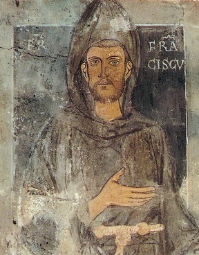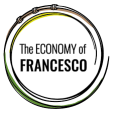Our Patron
Laudato Si and Saint Francis of Assisi
Saint Francis and the Sustainability of the Earth
"Laudato si', mi' Signore, per sora nostra matre terra, la che ne sustenta et governa, et produce diverse fructi con coloriti flori et herba." (orignal The Canticle of Creatures of St.Francis)
Praised be You, my Lord,
through our Sister Mother Earth,
who sustains and governs us,
and who produces various fruit
with coloured flowers and herbs.
Saint Francis was the first human on Earth - who has understood the importance of sustainability (sustenta et governato) for our Earth and Life - in the deepest possible sense.
Pope Francis about St. Francis (Laudato Si)
" I do not want to write this Encyclical without turning to that attractive and compelling figure, whose name I took as my guide and inspiration when I was elected Bishop of Rome. I believe that Saint Francis is the example par excellence of care for the vulnerable and of an integral ecology lived out joyfully and authentically. He is the patron saint of all who study and work in the area of ecology, and he is also much loved by non-Christians. He was particularly concerned for God’s creation and for the poor and outcast. He loved, and was deeply loved for his joy, his generous self-giving, his openheartedness. He was a mystic and a pilgrim who lived in simplicity and in wonderful harmony with God, with others, with nature and with himself. He shows us just how inseparable the bond is between concern for nature, justice for the poor, commitment to society, and interior peace.
11. Francis helps us to see that an integral ecology calls for openness to categories which transcend the language of mathematics and biology, and take us to the heart of what it is to be human. Just as happens when we fall in love with someone, whenever he would gaze at the sun, the moon or the smallest of animals, he burst into song, drawing all other creatures into his praise. He communed with all creation, even preaching to the flowers, inviting them “to praise the Lord, just as if they were endowed with reason”.[19] His response to the world around him was so much more than intellectual appreciation or economic calculus, for to him each and every creature was a sister united to him by bonds of affection. That is why he felt called to care for all that exists. His disciple Saint Bonaventure tells us that, “from a reflection on the primary source of all things, filled with even more abundant piety, he would call creatures, no matter how small, by the name of ‘brother’ or ‘sister’”.[20] Such a conviction cannot be written off as naive romanticism, for it affects the choices which determine our behaviour. If we approach nature and the environment without this openness to awe and wonder, if we no longer speak the language of fraternity and beauty in our relationship with the world, our attitude will be that of masters, consumers, ruthless exploiters, unable to set limits on their immediate needs. By contrast, if we feel intimately united with all that exists, then sobriety and care will well up spontaneously. The poverty and austerity of Saint Francis were no mere veneer of asceticism, but something much more radical: a refusal to turn reality into an object simply to be used and controlled.
12. What is more, Saint Francis, faithful to Scripture, invites us to see nature as a magnificent book in which God speaks to us and grants us a glimpse of his infinite beauty and goodness. “Through the greatness and the beauty of creatures one comes to know by analogy their maker” (Wis 13:5); indeed, “his eternal power and divinity have been made known through his works since the creation of the world” (Rom 1:20). For this reason, Francis asked that part of the friary garden always be left untouched, so that wild flowers and herbs could grow there, and those who saw them could raise their minds to God, the Creator of such beauty.[21]Rather than a problem to be solved, the world is a joyful mystery to be contemplated with gladness and praise.
*On November 29, 1979, Pope John Paul II declared St. Francis the Patron Saint of Ecology.
During the World Environment Day 1982, John Paul II said that St. Francis' love and care for creation was a challenge for contemporary Catholics and a reminder "not to behave like dissident predators where nature is concerned, but to assume responsibility for it, taking all care so that everything stays healthy and integrated, so as to offer a welcoming and friendly environment even to those who succeed us." The same Pope wrote on the occasion of the World Day of Peace, January 1, 1990, the saint of Assisi "offers Christians an example of genuine and deep respect for the integrity of creation ..." He went on to make the point that: "As a friend of the poor who was loved by God's creatures, Saint Francis invited all of creation – animals, plants, natural forces, even Brother Sun and Sister Moon – to give honor and praise to the Lord. The poor man of Assisi gives us striking witness that when we are at peace with God we are better able to devote ourselves to building up that peace with all creation which is inseparable from peace among all peoples."
Pope John Paul II concluded that section of the document with these words, "It is my hope that the inspiration of Saint Francis will help us to keep ever alive a sense of 'fraternity' with all those good and beautiful things which Almighty God has created."









